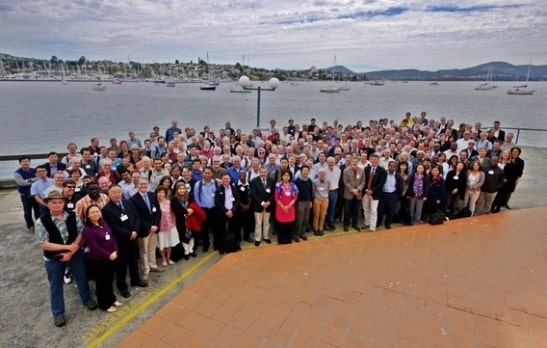IPCC personnel are not the world’s “leading climate scientists.” They were chosen partly due to gender, age, and geographic considerations.
It’s disturbing how routinely the public is misled regarding the nature of that UN body known as the Intergovernmental Panel on Climate Change (IPCC). Take, for instance, a page on the website of Australia’s Climate Commission titled The IPCC at work in Hobart.
In January of this year, IPCC Working Group 1 personnel gathered in Hobart, which is the capital city of Tasmania, an island state off of Australia’s coast. This photo, taken at that meeting, appears on the IPCC’s website:

The Climate Commission’s page begins this way:
Have you ever wondered what the Intergovernmental Panel on Climate Change (IPCC) is exactly and what’s involved in putting together one of their assessment reports?
It then proceeds to tell us that:
Last week more than 250 leading climate scientists from around the world met in Hobart.
The list of Working Group 1 authors may be found on the first 14 pages of this document. There’s no way of discerning, based on that IPCC-assembled material, what the credentials of these people actually are.
We’re told what country they come from and what organization they’re affiliated with. But we are provided with no evidence whatsoever that they’re “leading climate scientists.”
In 2010, a damning report concluded that the IPCC “has no formal process or criteria for selecting authors” (see the bottom of p. 33 – numbered as p. 15).
Indeed, when IPCC insiders were given an opportunity to comment on the way that authors are selected, they complained loudly about a lack of transparency. The process, they said, is “completely mysterious,” a “closed-door exercise,” and “a black box.”
In their view, politics plays a large role in the selection process, many authors are “clearly not qualified,” and bias can be a serious problem.
When the IPCC released the first version of that author list back in June 2010, its own press release told us that:
In selecting the author teams the IPCC stressed the need for regional and gender balance and recognized the importance of involving new and younger authors.
About 30% of authors will come from developing countries or economies in transition. The proportion of female experts, has significantly increased since the [2007 report], reaching approximately 25% of the selected authors. More than 60% of the experts chosen are new to the IPCC process, which will bring in new knowledge and perspectives.
IPCC authors are either the world’s leading climate scientists or they’re a group of people chosen partly because they are of the right gender and age, and come from the right geographic location. Those two things are not the same. The UN cannot have it both ways.
Australia’s Climate Commission further says that:
The IPCC is the leading international body for the assessment of climate change and is acknowledged by governments around the world, including the Australian Government, as the authoritative source of advice on climate change.
It’s perfectly true that governments recognize the authority of the IPCC. But there’s something rather important the public isn’t being told. Australia’s Chief Climate Commissioner himself, Tim Flannery, has a spectacularly low opinion of this body.
Here’s what he wrote on page 246 of his 2005 book, The Weather Makers:
the pronouncements of the IPCC do not represent mainstream science, nor even good science, but lowest-common-denominator-science.
It’s hard to get more scathing than that.
Environmental studies professor Roger Pielke Jr. is also critical of Australia’s Climate Commission in a blog post dated today.
It’s titled Thou Shall Not Critique the Australian Climate Commission (click), and accuses that organization of issuing a “rambling and vicious press release” attacking two researchers who publicly disagreed with one of its recent conclusions. In Pielke’s view, this is another example of the “self-destructive intolerance of the climate movement.”
Amazon.com says The Weather Makers was published in 2001. That is not correct. It appeared in 2005.





